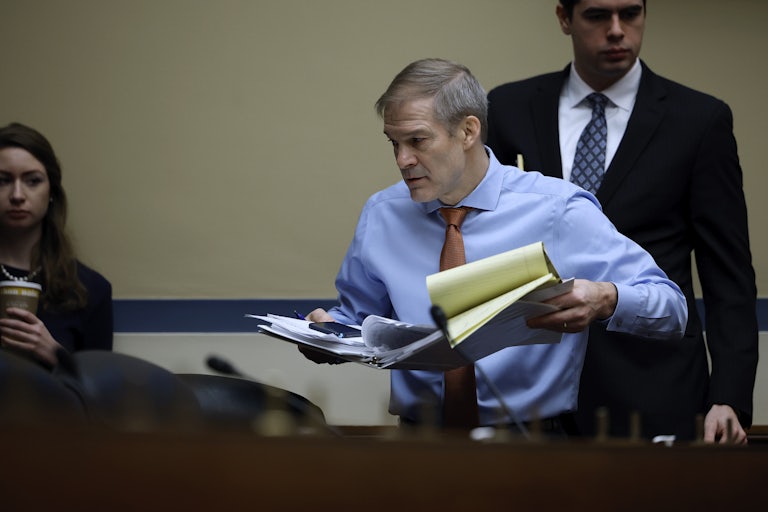King Charles Should Abolish Himself
The best thing the newly-minted monarch could do is bring an end to the monarchy.

This Saturday will bring the coronation of King Charles III, and the stateside media is, as always, in rapture over the royals. CNN, per habit, will be dedicating itself to a special day of live coverage of people standing around on streets waiting for things to happen. Here in Washington, D.C., The Washington Post has decided to cover it from every angle possible, from a guide on where to watch the festivities (which kick off in the early morning hours), to an upgraded recipe for “coronation quiche,” to an article from the paper’s own living tribute to patrimonial inertia, Sally Quinn—who argues that Charles might be the one figure who can get the world to take the climate calamity seriously. It is to be hoped that she’s wrong.
I’ve always found the weird hold the Royals have on the citizens of the United States to be fascinating. But what’s more keenly important is the weird hold that the Royals have on the United Kingdom—a hold that is starting to slip. According to a poll released last week by the National Centre for Social Research, “public support for the monarchy has fallen to a historic low,” with 45 percent of respondents saying “it should be abolished, was not at all important or not very important.” Still, that leaves a majority in favor of continuing the monarchy. What will it take to turn this around? Perhaps it’s up to Charles, who wants to be thought of as a transformational leader, to be the King that shuts down the kingdom.
Naturally, I shouldn’t expect our cousins across the pond to take advice from someone who lives in a gun-crazy dystopia that’s soon to have a third consecutive election to decide, by razor-thin margins, whether we’ll continue our experiment in democracy or hand the reins over to a caudillo. But there’s a long tradition at TNR of urging the abolition of the monarchy—and even advising Charles to be the one to do the deed. “If Charles I gave the British regicide, and Charles II gave it restoration, why shouldn’t you, at the moment of coronation, give it at long last a republic?” advised Thomas Mallon on these pages back in 2013, urging Charles to set the crown “aside, a simple and grand refusal” that might “smash the strongest pillar of his people’s magical thinking and subconscious self-hatred.”
But the best reason to dismantle the monarchy isn’t because it might bring about some vibe shift in a nation’s sense of self-worth. It’s because the monarchy is a huge scam. The royal family is staggeringly wealthy, with a net worth in the vicinity of $28 billion. This, on its own, TNR’s Tim Noah writes, is a fitting test of Thomas Piketty’s “r > g” hypothesis, in which the rate of return on capital is unsustainably outrunning the rate of return on labor, leading to a vicious cycle of ever-increasing income inequality. Piketty would probably appreciate Meghan Markle’s coping strategy: She may have married into a den of vipers, but in Piketty’s view, the way the economy has devolved into this “r > g” argy-bargy means that one of the few ways to play the game of capitalism and win is to marry into money. It’s getting harder and harder to accumulate wealth by simply earning an honest living.
And as Noah points out, an honest living is something that the Royals cannot claim to be making. Charles won’t be paying a cent of tax on the estate he’s about to inherit. What’s more, a significant chunk of his wealth is stashed in offshore accounts in Bermuda and the Cayman Islands, where they’re kept safe from the taxman’s clutches. Buckingham Palace has, naturally, disputed that they derive a substantial tax break by offshoring their wealth; there is no way to know for sure. But their noses are hardly clean, because they also play a substantial role in keeping the larger world of global tax dodgers spinning.
As TNR contributor Kojo Koram reported last September, a study from the Tax Justice Network found that “the world’s three most corrosive corporate tax havens are all British Overseas Territories”—the British Virgin Islands, Bermuda, and the Cayman Islands. “These tax havens are often presented in the media as strange foreign hideouts for dirty money,” writes Koram, “but they are all ruled by a British governor who represents the crown, carries the final say on the law and, every year leads the celebration of the queen’s birthday in a manner that resurrects the era of the old British West Indies.” It is precisely this royal sheen that allows these tax havens to “present themselves as part of the long history of English financial and legal expertise, not simply grubby secret money dens.”
The bottom line, Noah writes, is that while the monarchy might be a “ridiculous anachronism” as a governing institution, “as a form of capitalism, it’s the cutting edge,” largely because the royal family “accumulates wealth the same way it governs—by not doing anything.” And even beyond all that money sitting in secret accounts, earning money on top of itself, the royals take in another annual haul of boodle in the form of the taxpayer-funded Sovereign Grant, which in 2022 exceeded $107 million.
And though he may have the funds, I’m not sure that Charles truly has the charisma to be a transformational leader or Sally Quinn’s hoped-for climate savior. Julie Burchill, writing for TNR in 1993, described Charles as “a horrible hybrid of American psychobabbling self-pity, German pomposity and Scandinavian introspection. Knowing full well that he is not possessed of anything like a first-class mind, he settled into a sort of permanent whining restlessness that dumb people consider makes them seem ‘deep.’ But being dissatisfied and being deep are not the same thing.”
Three decades later, from this side of the pond, it’s not clear that Charles should be described any differently—except that he is vastly richer. He can hardly expect to harness his celebrity for positive change in the world while simultaneously serving as the central figure in a massive plutocratic con job. The best thing he can do with his reign is cash out, close up shop, give the lucre back to the people, and free all of us from the weird psychological fascination with the Crown.
This article first appeared in Power Mad, a weekly TNR newsletter authored by deputy editor Jason Linkins. Sign up here.








